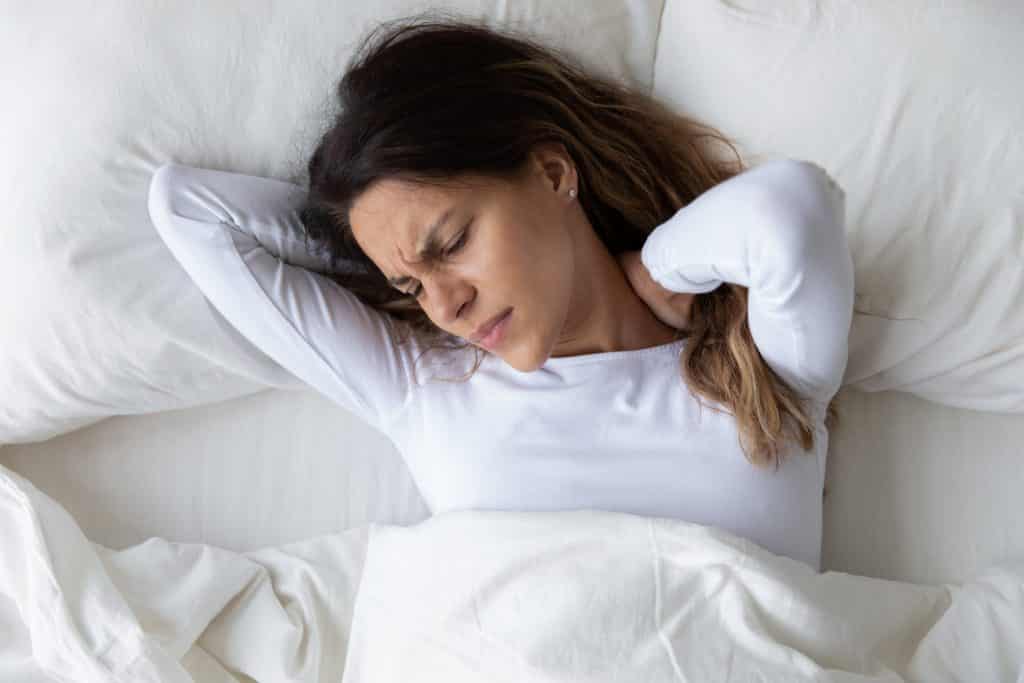
Sleep is essential for our bodies to function at their best. The American Academy of Sleep Medicine recommends that adults get seven or more hours of sleep a night to be at their healthiest. However, when you are living with a chronic pain condition, it can be a battle to even get a few hours of sleep a night. And even, if you do it may not be the sleep that feels restorative to you. So how does your chronic pain affect your sleep and what can you do about it?
Why Does Chronic Pain Disrupt Sleep?
Chronic pain can disrupt your sleep in many ways. 67-88% of those who suffer from chronic pain say that their sleep suffers due to their pain.
Pain
The pain you experience doesn’t end when you fall asleep. You may experience more pain with exercise or more movement, but your pain can make it difficult for you to get comfortable enough to fall asleep or stay asleep.
Medication Side Effects
If you experience chronic pain, you may be on prescription medications for it. Sometimes these medications can have side effects that can disrupt your sleep cycle. If you aren’t reaching certain cycles in your sleep you might not experience restful sleep.
Reduced Activity Levels/Disrupted Routine
When you are in a state of pain during the day you may not be able to be as active as you want to be. This can cause you to not be as tired when it comes to the end of the day. It may take you longer to finally fall asleep, which can cause you to wake up later the next morning. Your internal body clock will start to be disrupted.
What Does Poor Sleep Do to My Chronic Pain?
Higher Response to Pain
A lack of sleep in those who suffer from chronic pain can actually cause their pain to be worse. Increased sensitivity to pain can be caused by a lack of sleep. When you suffer from pain on a daily basis, this is never something that you want. Many of the areas of our brain which control our sleep also play a huge role in controlling our pain. The area of our brain which is responsible for whether we are awake or asleep has an overlapping function of pain inhibition.
Inflammatory Response
If you are not getting enough sleep your immune system can also be affected. When your immune system is not functioning well, it can cause an inflammatory response in your body which causes increased chronic pain levels. On top of the increased chronic pain, the inflammatory response can also damage cells and organs in your body if not treated properly.
Mental Health Impacts
A lack of sleep can greatly impact our mental health. We all know from experience that if we aren’t getting adequate sleep, we do not feel at our best. Your mental health greatly impacts your overall health. If your mental health is not at its best, you are less likely to be doing all you need to be to keep up with your chronic pain treatment to keep your symptoms at bay. Also, when you are struggling with your mental health, it is harder to distract yourself from your chronic pain.
What Do I Do About Chronic Pain and Sleep?
There are many things you can do on your own to help your chances of getting a good night’s sleep. Here are some great tips:
- Avoid taking naps during the day
- Set a bedtime and awake time to get yourself back on schedule
- Try being active during the day to try to ‘wear your body out’
- Try a wind-down routine to get your body ready for bed
- Try practicing Mindfulness
- Turn off the electronics
Contact a Professional
If you find yourself struggling with your sleep, seeking out help from a pain management specialist like The Arthritis Relief Institute could help you get the rest you need to get your body back to its best state. Treating your chronic pain is always the best way to ensure that you will be getting the best sleep possible. There are a variety of options available to treat your chronic pain so you can get a good night’s rest. Give us a call today (972) 945-0785 and we can help.

Recent Comments